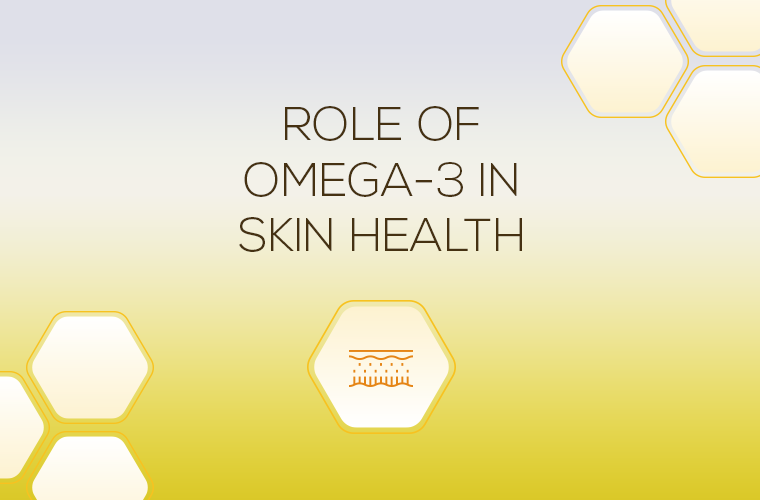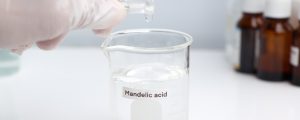Skin is the largest organ of your body and the boundary between the internal organs and the rest of the world. Skin is not only largely responsible for holding all the bodily fluids inside, thus preventing unprecedented dehydration, but it also keeps the harmful microbes outside. Moreover, the skin surfeits with nerve endings that are responsible for all the sensations of touch, pain, heat, cold, and so on.[1]
Therefore, something that is responsible for so many crucial functions, your skin sure does need special care. However, our skin frequently faces issues like dry skin, acne, cold sore, dry patches, dull skins, wrinkles, fine lines aging.
So, why are skin issues so ubiquitous?
Factors Affecting Skin Health
Blemish free, radiant, and supple skin is something that everyone wants. However, lifestyle, environmental, dietary factors can affect the health of your skin.
1. Poor Nutrition
Healthy skin maintains a proper barrier between your internal organs and your environment, keeping pathogens and other toxins out. Just like the body, your skin is always under construction – with the constant generation of new cells and the replacement of the dead cells. The body also requires nutrition to produce collagen – the building block of skin. Skin gets the key nutrients to perform their daily functions as well as cell repair, regeneration, and replacement from the food we eat. Lack of key nutrients such as Vitamins, Minerals, Antioxidants, collagen, and Omega can lead to multiple skin problems. Including foods that are rich in Vitamins & Minerals, Antioxidants such as lime, oranges, and tomatoes and Omega-3 rich fatty fish such as tuna, mackerel and salmon can help you retain radiant skin.[2]
2. Exposure to Sun
Our skin needs sunlight to synthesize Vitamin D. Vitamin D is important for bone health and function. However, too much sun exposure can damage the skin. Highly energetic UV rays from the sun can enter our skin cells and affect our skin’s growth. UV rays can damage skin cells, cause sunburn and trigger premature skin aging [3]. Over time, it can make the skin less elastic, leathery, and wrinkled.
3. Pollution
Air pollution affects not just our lungs, heart and brain but has an effect on your skin and hair as well. Exposure to airborne allergens, toxic gas emissions, hard water can cause hyperpigmentation, skin aging, and acne breakout. Particulate exhausts from emissions are at times 20 times smaller than skin pores. They infiltrate to the deeper layers of the epidermis and can cause skin inflammation, dehydration, and loss of elasticity. [4]
4. Stress
Stress is known to affect mental and physical health. Stress is the body’s natural response to a ‘fight-or-flight’ situation and chemical secretion during stressful situations makes your skin more reactive and sensitive. When you are stressed, the body releases cortisol hormone. The hormone triggers excess sebum or oil production leading to oily skin. Inflammation response to a stressful situation can lead to more frequent acne breakouts, skin sensitivity, irritant dermatitis. Stress can also aggravate dermatological conditions such as psoriasis, rosacea, and eczema. Stress also triggers an increase in the free radicals in the body leading to oxidative stress which breaks down collagen and hyaluronic acid which gives your skin its glow.
5. Poor Sleep
A good night’s sleep means good skin health. Proper sleep plays an important role in maintaining the immune system. A change in the immune system due to poor sleep can affect collagen production in the body. Poor sleep can also affect blood flow to the skin [5] which provides the skin healthy appearance. The deprivation of blood circulation can cause the skin to look pale. During sleep, the skin recovers its moisture. A lack of proper sleep can also lead to puffy bags, dryness, and wrinkles under the eyes.
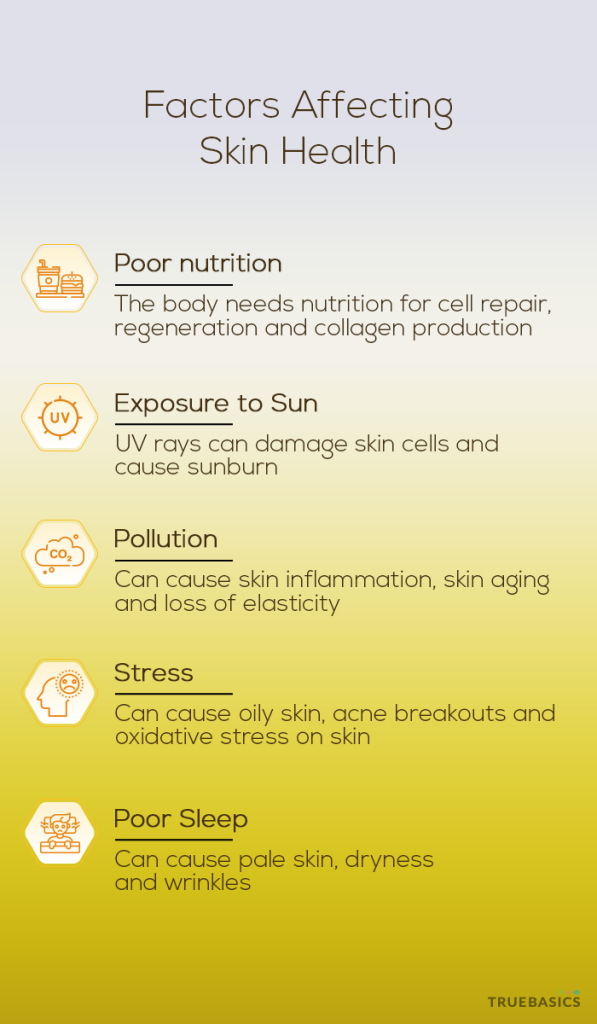
6. Smoking
The ill-effects of smoking on lungs are widely known but it can affect your skin health too. Smoking generates excess free radicals in the body and strips your skin of essential nutrients and antioxidants. This leads to degradаtion of the basic units of the skin – collagen and elastin. The affected units also lead to uneven skin, the appearance of fine lines and sagging. Cigarette smoke contains carbon monoxide, which displaces the oxygen in your skin, with nicotine, which reduces blood flow, leaving skin dry and discolored.[6] [7]
7. Alcohol
Excessive alcohol consumption can lead to skin aging. Alcohol contains diuretics which increases the production of urine and dehydrates the body. Additionally, alcohol also makes skin look drier [8]. It alters the blood vessels in your skin and slowly dilates them. Excessive consumption of alcohol can show up on your skin as a fine line and even swelling.
If you drink excessively or drink too much at a time, your skin will start to age more rapidly than the skin of someone who partakes in occasional drinking. Though there is no limit set on min or maximum limit of alcohol consumption for skin effects to manifest but monitoring your drinking consumption is recommended for keeping your skin clear, hydrated, supple, and wrinkle-free. [9]
8. Cosmetics Products
While cosmetic products are often used on a daily basis to look good, the downside of regular cosmetic usage is often ignored. Forgetting to remove the makeup before sleep can clog skin pores and lead to acne. Overnight makeup also increases skin wrinkles. Applying skin products often also causes more damage to the skin than the benefit. Certain cosmetic products can also make your skin either oily or drier than usual. [10]
9. Genetics
Genes are the basic functional units used to determine heredity. Working subunits of DNA, they act as instruction manuals for the body to generate proteins. They also play a major role in determining our looks and other physical traits. [11]
Your overall skin condition could be determined by their genetics to a large extent. Their skin could be dry, oily, or normal depending on their genes. More than simply the apparent characteristics of it, genetics also plays a huge role in determining the biological aging of the skin. Biological aging is generally marked by a shortfall in cell reformation, reduced sweat gland secretions and a noticeable degeneration of the connective tissue so that skin loses firmness.[12]
10. Hormones
Hormones are chemical messengers produced by the endocrine gland in your body. They tend to have a very strong effect on bodily processes and play a huge role in building your metabolism, developing your sexuality, and, the body as a whole.
Hormonal changes in the body trigger puberty acne. Moreover, hormones are responsible for an increase in the production of melanin (the color pigment present in the skin) during pregnancy. The estrogen levels in females also decline with biological aging and decrease rapidly after menopause. Estrogen is known to have beneficial effects on the moisture balance of the skin and low levels of estrogen can lead to structural changes in the skin. [13]
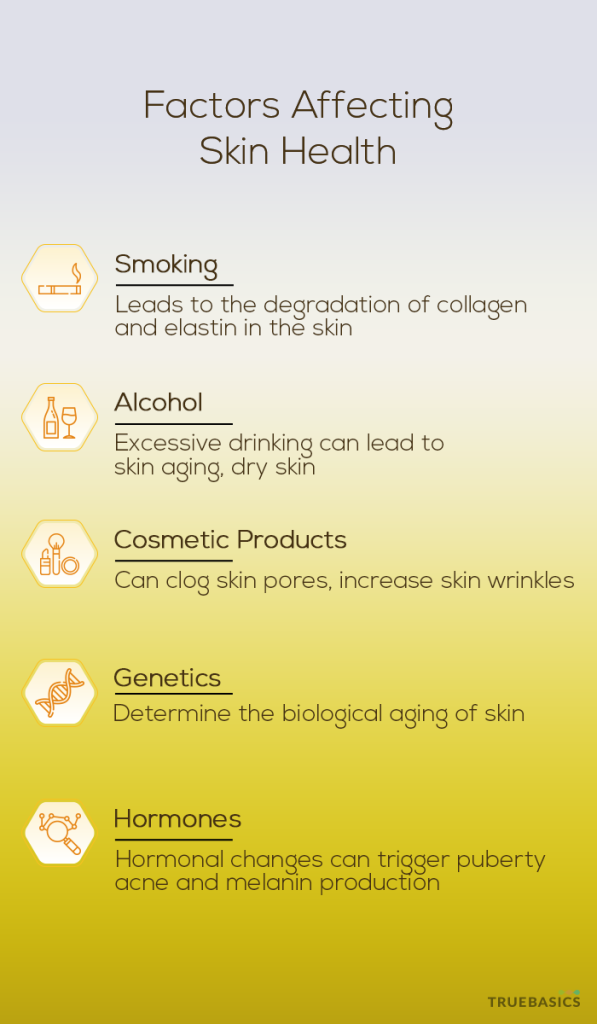
Effects of Omega-3 On the Skin
Omega-3 are essential polyunsaturated fatty acids and play a key role in the maintenance of heart, brain, eye, joint and skin health. Omega-3 has anti-inflammatory properties and helps combat skin inflammation. Omega-3 can help stop skin redness, swelling, and irritation. Omega-3 has also shown its potential in the treatment of eczema and dermatitis. [14]
Omega-3 also helps in fighting dry skin by retaining moisture and repairs the skin areas affected by UV rays and pollution. Fish oil, which is a major source for Omega-3, has been broadly reported as a potential nutritional supplement to curb multiple skin disorders like allergies, skin cancer, melanogenesis. [15]
Role of Omega-3 In Skin Health
1. Repairs dry skin
Dry skin is a common skin problem that everyone wants to avoid. It can cause your skin to be itchy, red, scaly, and can cause small cracks in the skin.
The reduction in the epidermal water content of the skin causes it to dry out. Omega-3 works as a barrier to keep moisture within the skin аnd irritation out. Thus, even when the skin faces dry climate and dulling agents, this barrier keeps the skin hydrated and healthy. [16]
2. Skin rejuvenation
Although a fashion trend, there is no such thing as getting a healthy tan. Overexposure to the sun can lead to multiple skin problems, and at its utmost severity sometimes even skin cancer [17]. Exposure to UV rays can also cause skin problems such as liver spots (small, flat dark areas on the skin), actinic keratosis (rough, scaly patches), leathery skin, and skin wrinkles. [18]
An active supply of Omega-3 can strengthen the very structure of the skin cells and helps in the formation of new cells. So even if UV rays, pollution, and stress wreak havoc on the skin, you can count on the restorative properties of Omega-3 to repair the skin cell membrane and make it stronger. [19]
3. Protection against UV rays
When the skin is exposed to excessive sunlight for longer durations it turns red and can cause irritation in the region, also known as inflammations.
Omega-3 has powerful anti-inflammatory properties. Therefore, omega-3 not only protects the skin cells from inflammations caused by the sun but also controls your body’s response to UV rays by calming the flaking top layer of dead cells. [20]
4. Fights wrinkles
When pollution, stress and an unhealthy diet trigger inflammation, your skin’s collagen suffers, making it harder for the skin to bounce back when you make facial expressions. This, in turn, can lead to wrinkles around the eyes and mouth and on the forehead. [21]
Omega-3 helps strengthen the skin cell membrane of the epidermis and monitors the inflow of nutrients and outflow of waste products. It also, as a part of the process, influences the cell’s ability to retain water, keeping the skin cells hydrated. The hydrated skin cells lead to softer, wrinkle-free skin. [22]
5. Helps reduce acne
Acne is a disease of the hair follicles of the face and the chest region which is generally first encountered during puberty. Excess sebum (oil) production due to hormones and accumulation of dead skin cells in the pores of the skin can lead to a clogged hair follicle or a blackhead.
Omega-3 helps fight pimple by regulating hormones and helps control the release of testosterone that triggers the overproduction of sebum. [23]
Acne is also caused by inflammation. Omega-3 present in fish oil helps fight inflammation [24], it indirectly curbs further acne growth and detoxifies the ones already present. [25]
6. May help prevent skin cancer
High energy UV rays from sunlight can produce mutations in the DNA of skin cells, which in turn can lead to skin cancer.
Immunosuppression is a condition in which sunlight suppresses the immune system, disabling it to fight against skin infections and cancer. Omega-3 with its anti-inflammatory properties helps bring down immunosuppression [26]. The study conducted by the University of Manchester reported that consuming dietary Omega-3 (mainly fish oil) can dramatically reduce inflammatory responses and enhances the delayed-type hypersensitivity immune response. It also inhibits UV radiation carcinogenic expression and reduces tumor multiplicity.
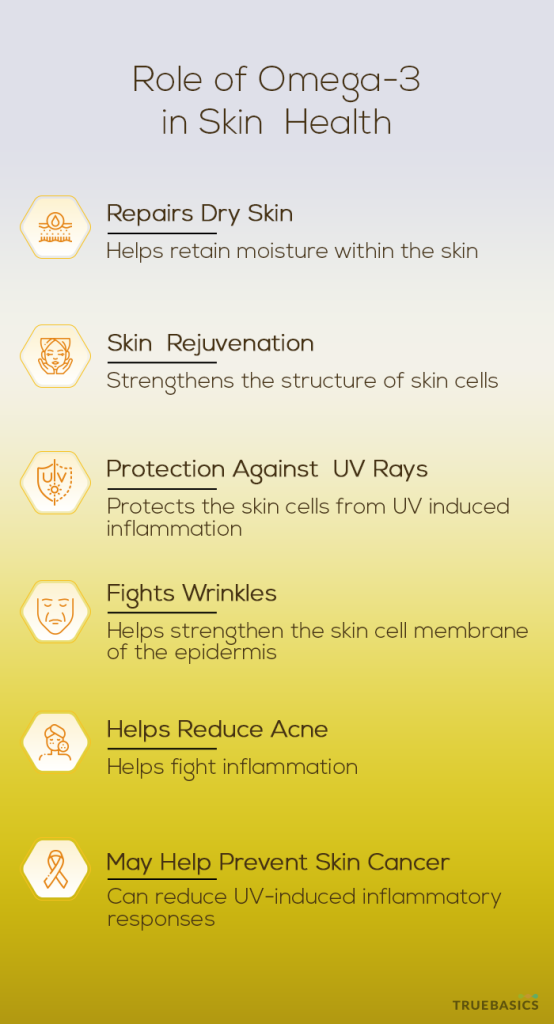
In Conclusion…
Our skin ages with us and have to sustain several environmental, lifestyle and internal factors to make us look good. Lack of right nutrition can further add to the challenges of maintaining healthy skin. Make changes to your lifestyle and include omega-3 in your diet to strengthen the skin’s defenses and rejuvenate the skin. Omega-3 would not only support you in your heart, joint, brain health but also help you gain youthful skin that you crave.
Sources:
[1] https://www.webmd.com/beauty/skin-care-basics
[2] https://www.ncbi.nlm.nih.gov/pmc/articles/PMC3583891/
[3] https://newsinhealth.nih.gov/2014/07/sun-skin
[4] https://www.raconteur.net/healthcare/how-does-pollution-affect-skin.
[5] https://www.ncbi.nlm.nih.gov/pmc/articles/PMC5451790/
[6] https://www.webmd.com/smoking-cessation/ss/slideshow-ways-smoking-affects-looks.
[7] https://dermnetnz.org/topics/smoking-and-its-effects-on-the-skin/
[8] https://www.realsimple.com/beauty-fashion/skincare/alcohol-effects-on-skin
[9] https://www.elle.com/uk/beauty/skin/a40482/effects-alcohol-on-skin/
[10] https://reverehealth.com/live-better/do-your-makeup-habits-harm-your-skin/
[11] https://ghr.nlm.nih.gov/primer/basics/gene
[12] https://int.eucerin.com/about-skin/basic-skin-knowledge/factors-that-influence-skin
[13] https://int.eucerin.com/about-skin/basic-skin-knowledge/factors-that-influence-skin.
[14] https://www.ncbi.nlm.nih.gov/pmc/articles/PMC5006549/
[15] https://www.ncbi.nlm.nih.gov/pmc/articles/PMC6117694/
[16] https://www.webmd.com/beauty/features/want-healthy-skin-feed-well.
[17] https://www.skincancer.org/risk-factors/uv-radiation/
[18] https://www.cancer.org/cancer/cancer-causes/radiation-exposure/uv-radiation.html
[19] https://omega3innovations.com/blog/can-omega-3s-help-prevent-sunburns-and-skin-cancer/
[20] https://www.ncbi.nlm.nih.gov/pubmed/21569104
[21] https://www.dermalogica.com/does-pollution-age-your-skin%3F/does-pollution-age-your-skin,default,pg.html
[22] https://www.huffpost.com/entry/omega-3-anti-aging-_b_993047
[23] https://www.skinography.co.nz/journal-1/2018/8/19/how-omega-3-fish-oil-can-help-with-acne
[24] https://www.ncbi.nlm.nih.gov/pmc/articles/PMC3543297/
[25] https://www.ncbi.nlm.nih.gov/pubmed/24505395
[26] https://www.sciencedaily.com/releases/2013/02/130226092002.htm

